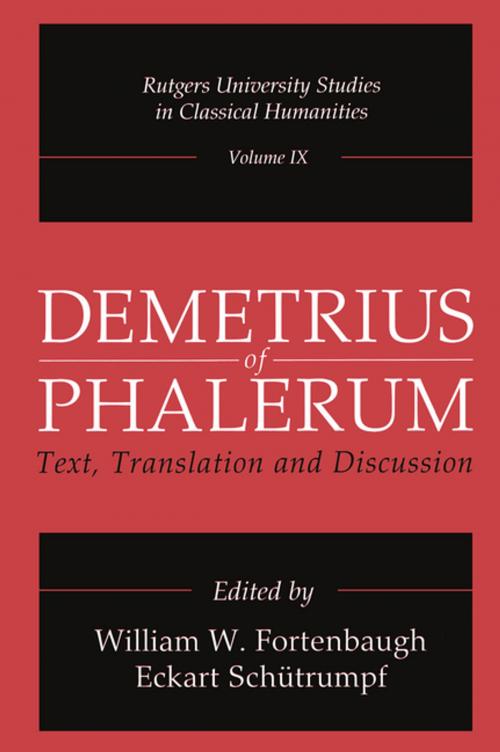Demetrius of Phalerum
Text, Translation and Discussion
Nonfiction, Religion & Spirituality, Philosophy, Ancient| Author: | Eckart Schütrumpf | ISBN: | 9781351326902 |
| Publisher: | Taylor and Francis | Publication: | February 6, 2018 |
| Imprint: | Routledge | Language: | English |
| Author: | Eckart Schütrumpf |
| ISBN: | 9781351326902 |
| Publisher: | Taylor and Francis |
| Publication: | February 6, 2018 |
| Imprint: | Routledge |
| Language: | English |
Demetrius of Phalerum (c. 355-280BCE) of Phalerum was a philosopher-statesman. He studied in the Peripatos under Theophrastus and subsequently used his political influence to help his teacher acquire property for the Peripatetic school. As overseer of Athens, his governance was characterized by a decade of domestic peace. Exiled to Alexandria in Egypt, he became the adviser of Ptolemy. He is said to have been in charge of legislation, and it is likely that he influenced the founding of the Museum and the Library.
This edition of the fragments of Demetrius of Phalerum reflects the growing interest in the Hellenistic period and the philosophical schools of that age. As a philosopher-statesman, Demetrius appears to have combined theory and practice. For example, in the work On Behalf of the Politeia, he almost certainly explained his own legislation and governance by appealing to the Aristotelian notion of politeia, that is, a constitution in which democratic and oligarchic elements are combined. In On Peace, he may have defended his subservience to Macedon by appealing to Aristotle, who repeatedly recognized the importance of peace over war; and in On Fortune, he will have followed Theophrastus, emphasizing the way fortune can determine the success or failure of sound policy. Whatever the case concerning any one title, we can well understand why Cicero regarded Demetrius as a unique individual: the educated statesman who was able to bring learning out of the shadows of erudition into the light of political conflict, and that despite an oratorical style more suited to the shadows of the Peripatos then to political combat.
The new edition of secondary reports by Stork, van Ophuijsen, and Dorandi brings together the evidence for these and other judgments. The facing translation which accompanies the Greek and Latin texts opens up the material to readers who lack the ancient languages, and the accompanying essays introduce us to important issues. The volume will be of interest to those interested in Greek literature, Hellenistic philosophy, Hellenistic history, and generally to persons captivated by the notion of philosopher-statesman.
Demetrius of Phalerum (c. 355-280BCE) of Phalerum was a philosopher-statesman. He studied in the Peripatos under Theophrastus and subsequently used his political influence to help his teacher acquire property for the Peripatetic school. As overseer of Athens, his governance was characterized by a decade of domestic peace. Exiled to Alexandria in Egypt, he became the adviser of Ptolemy. He is said to have been in charge of legislation, and it is likely that he influenced the founding of the Museum and the Library.
This edition of the fragments of Demetrius of Phalerum reflects the growing interest in the Hellenistic period and the philosophical schools of that age. As a philosopher-statesman, Demetrius appears to have combined theory and practice. For example, in the work On Behalf of the Politeia, he almost certainly explained his own legislation and governance by appealing to the Aristotelian notion of politeia, that is, a constitution in which democratic and oligarchic elements are combined. In On Peace, he may have defended his subservience to Macedon by appealing to Aristotle, who repeatedly recognized the importance of peace over war; and in On Fortune, he will have followed Theophrastus, emphasizing the way fortune can determine the success or failure of sound policy. Whatever the case concerning any one title, we can well understand why Cicero regarded Demetrius as a unique individual: the educated statesman who was able to bring learning out of the shadows of erudition into the light of political conflict, and that despite an oratorical style more suited to the shadows of the Peripatos then to political combat.
The new edition of secondary reports by Stork, van Ophuijsen, and Dorandi brings together the evidence for these and other judgments. The facing translation which accompanies the Greek and Latin texts opens up the material to readers who lack the ancient languages, and the accompanying essays introduce us to important issues. The volume will be of interest to those interested in Greek literature, Hellenistic philosophy, Hellenistic history, and generally to persons captivated by the notion of philosopher-statesman.















